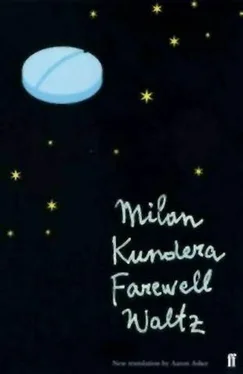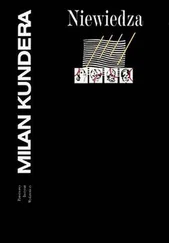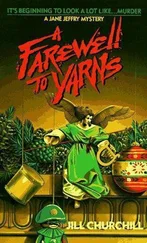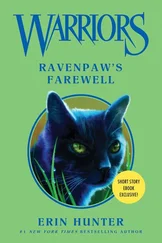When Jakub gave the nurse the tube containing the poison, he had nothing like that in mind. Jakub was not wondering whether a man had the right to sacrifice the life of another. On the contrary, Jakub had always been convinced that no one had that right. Jakub was living in a world where people sacrificed the lives of others for the sake of abstract ideas. Jakub knew the faces of these people, faces now brazenly innocent, now sadly craven, faces that apologetically but meticulously carried out cruel verdicts on their neighbors. Jakub knew these faces, and he detested them. Moreover, Jakub knew that every human being wishes for someone's death, and that only two things deter him from murder: fear of punishment and the physical difficulty of inflicting death. Jakub knew that if everyone had the power to kill in secret and at a distance, mankind would vanish in a few minutes. He therefore concluded that Raskolnikovs experiment was totally useless.
Why then had he given the poison to the nurse? Was it simply by chance? Raskolnikov had actually spent a long time plotting and preparing for his crime, while Jakub had acted on the impulse of a moment. But Jakub realized that he, too, had unknowingly for many years been preparing for his act of murder, and that the instant he gave the poison to Ruzena was a fissure into which had been shoveled all of his past life, all of his disgust with mankind.
When Raskolnikov murdered the old woman usurer with an ax, he knew that he was crossing a horrifying
threshold; that he was transgressing divine law; he knew that although the old woman was contemptible, she was a creature of God. The fear that Raskolnikov felt, Jakub had not experienced. For him human beings were not creatures of God. Jakub loved scrupulousness and high-mindedness, and he was persuaded that these were not human qualities. Jakub knew human beings well, and that is why he did not love them. Jakub was high-minded, and that is why he gave them poison.
So I am a murderer out of high-mindedness, he said to himself, and the thought seemed ridiculous and sad.
After Raskolnikov killed the old usurer he did not have the strength to control the tremendous storm of remorse. Whereas Jakub, who was deeply convinced that no one had the right to sacrifice the lives of others, felt no remorse at all.
He tried to imagine that the nurse had really died, to see if he felt any guilt. No, he felt nothing of the kind. His mind calm and at peace, he drove on through the pleasant region that was bidding him farewell.
Raskolnikov experienced his crime as a tragedy, and eventually he was overwhelmed by the weight of his act. Jakub was amazed that his act was so light, so weightless, amazed that it did not overwhelm him. And he wondered if this lightness was not more terrifying than the Russian character's hysterical feelings.
He drove slowly, now and then interrupting his reflections to look at the landscape. He told himself that the episode of the tablet had been merely a game,
an inconsequential game like his whole life in this land on whose soil he had left not a single trace, not a root or a furrow, a land he was now going away from as a breeze goes away.
Lighter by a quarter liter of blood, Klima impatiently waited for Dr. Skreta in his waiting room. He did not wish to leave the spa without saying goodbye and asking him to look after Ruzena a bit. "Until they take it away from me, I can still change my mind." He could still hear these words of hers, and they frightened him. He was afraid that after he left and Ruzena was no longer under his influence, she might at the last minute go back on her decision.
Dr. Skreta finally appeared. Klima rushed toward him, said goodbye, and thanked him for his beautiful work on the drums.
"It was a great concert," said Dr. Skreta, "you played wonderfully. Let's hope we can do it again! We have to think about arranging concerts like that at other spas."
"Yes, I'd be glad to do it, I enjoyed playing with you!" the trumpeter said eagerly, and he added: "I want to ask you a favor. If you could look after Ruzena
a bit. I'm afraid she'll get all worked up again. Women are so unpredictable."
"She won't get worked up anymore, don't worry," said Dr. Skreta. "She's no longer alive."
For a moment Klima did not understand, and Dr. Skreta explained what had happened. Then he said: "It's suicide, but there's something rather puzzling about it. Some people might find it odd that she did away with herself an hour after appearing before the committee with you. No, no, no, don't worry," he added, seizing the trumpeter by the hand when he saw him turning pale. "Fortunately for us, Ruzena had a boyfriend, a young repairman who's convinced the child is his. I've stated that there was never anything between you and the nurse, that she simply persuaded you into playing the child's father because the committee doesn't authorize abortions when both parents are single. So don't spill the beans if you're ever interrogated. You're clearly on edge, and that's a pity. You've got to pull yourself together, because we've still got a lot of concerts ahead of us."
Klima was speechless. He kept bowing to Dr. Skreta and kept shaking his hand.
Kamila was waiting for him in the room at the Richmond. Klima took her in his arms and without a word kissed her on the cheek. He kissed her all over her face, then he kneeled and kissed her dress down to her knees.
"What's come over you?"
"Nothing. I'm so lucky to have you. I'm so lucky you exist."
They packed their bags and carried them to their white sedan. Klima said he was tired and asked her to take the wheel.
They drove in silence. Klima was exhausted, yet greatly relieved. He was still somewhat uneasy about the thought that he might yet be interrogated. If that should occur, Kamila might get wind of something. But he repeated to himself what Dr. Skreta had told him. If he were to be interrogated, he would play the innocent (and in this country common enough) role of the gentleman who plays the father to do a good turn. No one could hold it against him, not even Kamila if she happened to hear about it.
He looked at her. Her beauty filled the space of the car like a heady perfume. He told himself that he wished to breathe only that perfume for the rest of his life. Then he heard in his mind the sweet, distant music of his trumpet, and he resolved for the rest of his life to play this music solely to please her, his only and dearest woman.
Whenever she took the wheel, she felt stronger and more independent. But this time it was not only the wheel that gave her self-confidence. It was also the
words of the stranger she had met in the corridor of the Richmond. She was unable to forget them. Nor was she able to forget his face, so much more virile than the smooth face of her husband. Kamila reflected that never before had she known a man, a real man.
She looked sidelong at the trumpeter's tired face, which kept breaking into inscrutably blissful smiles while his hand lovingly caressed her shoulder.
This excessive tenderness neither pleased nor touched her. Insofar as it was inexplicable, it confirmed yet again that the trumpeter had his secrets, a life of his own that he hid from her and excluded her from. But now, instead of hurting her, the observation left her indifferent.
What had the man said? That he was leaving forever. A sweet, prolonged yearning wrung her heart. Not only a yearning for the man but also for the lost opportunity. And not only for that opportunity but also for opportunity as such. She had a yearning for all the opportunities she had let pass, escape, evaded, even for those she had never had.
The man had told her that he had lived all his life like a blind man, that he had not even suspected that beauty exists. She understood him. Because it was the same with her. She, too, lived in blindness. She had been seeing only a single being lit up by the floodlight of her jealousy. And what would happen if that floodlight abruptly went out? In the unfocused light of day other beings would suddenly appear by the thousands,
Читать дальше










